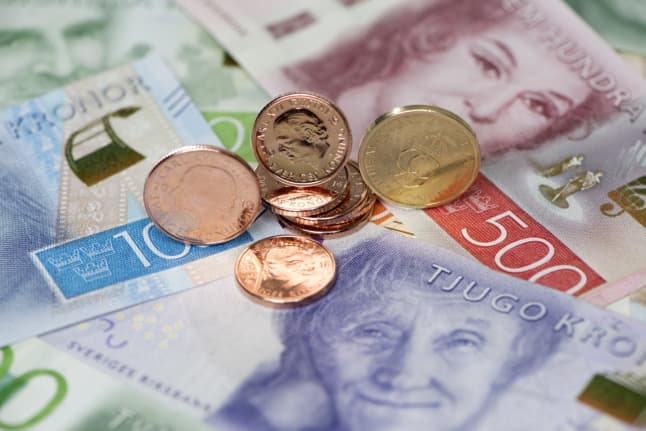What does Sweden's increasing inflation rate mean for you?

Swedish inflation rates are now at their highest level since September 2008. But how may this affect foreigners living in Sweden?
UPDATE: In November Sweden's inflation rate continued to rise to 3.6 percent. Click HERE to read more.
Sweden's inflation rates rose to 3.1 percent in October compared with 2.8 percent in September, according to the CPIF (Consumer Price Index with fixed interest) measurement.
The CPIF measurement, which is that used by the Swedish Central Bank, subtracts the effects from changes to mortgage rates from the CPI (Consumer Price Index) measurement.
Excluding the effect of rising energy prices on inflation, CPIF inflation in October stood at 1.8 percent, compared with 1.5 percent in September.
But how will this affect you?
What does higher inflation mean?
Inflation means that the price of goods is increasing. It can become an issue if wages don't rise at the same speed, as salaries have to stretch further. This leads to the real value of wages decreasing, so consumers end up with less money in their wallets.
What does this mean for foreigners in Sweden?
Andreas Wallström, Swedbank's head of forecasting and deputy head of macro research, believes that those living in Sweden who are employed by a Swedish company will "most likely" be affected by rising inflation rates "to the same extent as Swedes".
"I can't see that foreigners living in Sweden would have particularly different consumption habits to average Swedes, they most likely have a home where they're paying for rising energy prices, probably also – to the same extent as Swedes – transport prices, rising fuel costs," he told The Local. Their Swedish salaries would also most likely rise in line with Swedish inflation rates.
However, those living in Sweden who are receiving their income from another country may notice a difference.
"If you have high inflation in one country, but income in another country, where inflation isn't so high, you might lose purchasing power, that is to say that your true income would actually decrease," said Wallström.
Those working for employers in other European countries will probably be unaffected, but those earning in US dollars, for example, could notice a difference.
"If you look at Europe at the moment, the way in which the inflation rate is developing looks similar in a lot of countries – more or less in Europe, on average, inflation this autumn is at around 3 percent, which is the same as in Sweden. The USA is sticking out, though, where it's noticeably higher, more than twice as high than here in Sweden," Wallström continued.
Could this result in a stronger Swedish krona? Photo: Sofia Sabel/imagebank.sweden.se
What could the knock-on effects of this be?
Rising inflation levels, if they continue, could also result in the Swedish krona's value increasing.
"If inflation stays high, then the Swedish Central Bank might tighten up their monetary policy a little bit faster than the ECB [European Central Bank] will in Europe, for example. Then that could be a reason for the krona increasing in value slightly in the future, which could benefit people living abroad with their income in Swedish kronor," explained Wallström. Conversely, this could be bad news for those living in Sweden and earning in other currencies, as their salary, when converted into Swedish kronor, would be worth less.
This could be good news for companies working with imports, on the other hand, although Wallström warns not to get too excited about this: "If the krona gets stronger, then it would absolutely be good news for import companies. That said, though, there aren't many right now who think the krona is going to get much stronger – most analysts, including us, think that the krona will get a little bit stronger, but not a lot. We don't really think that the Swedish Central Bank will raise interest rates much more than the ECB will, rather they'll stay low."
Should I be worried about rising inflation rates?
Probably not, thinks Wallström, unless inflation in the USA starts to affect Sweden.
"I don't think so, at least not in Europe generally – I think maybe what's happening with inflation in the USA sticks out as more worrying, and I think it could be more long-term. And the effect which that could have on Sweden is that if American inflation stays high, then maybe the American Central Bank could raise interest rates earlier, and by more than expected – which could lead to higher interest rates globally, which could lead to higher interest rates in Sweden, which could weaken house prices in the future."
High energy prices are one reason for the recent rise in inflation rates. Photo: Janerik Henriksson/TT
What is causing it?
Wallström believes there's a good explanation for current high inflation rates, especially when comparing the rates year-on-year – energy prices. But they won't cause inflation to keep rising as long as they stay high but don't increase further.
"Around half of inflation is energy prices, and what we know is, even if electricity and fuel prices in spring are still high, inflation is the difference in energy prices from one year to the next, so high electricity prices won’t contribute that much to inflation in the future, even if they’re still high," he explained.
This also means that if fuel and energy prices decrease next year, we could see inflation rates fall again.
"We can't rule out the fact that energy prices could even decrease somewhat, economic growth could slow down somewhat, and then we could end up seeing inflation fall because of energy prices. Energy prices are often very volatile," Wallström said.
He added that it was a good sign that it was mainly energy prices which were increasing year-on-year, "so as long as we don't get a very wide spread of inflation – that a lot of goods and services see rising prices, which I don't see many signs of in Sweden or Europe in general".
In the past month, other goods and services that have seen a price increase include food and drinks, and cultural services and goods such as package holidays, tickets to sports and cultural events, and ski equipment, according to a report from Statistics Sweden, which suggests that these price increases may be due to the easing of pandemic restrictions.
“We noted a broad price increase on recreational and cultural services such as sports competitions, cinemas, theatres and admission fees to dance clubs. This development may be related to eased restrictions,” said Sofie Öhman, statistician at Statistics Sweden, in a statement.
Comments
See Also
UPDATE: In November Sweden's inflation rate continued to rise to 3.6 percent. Click HERE to read more.
Sweden's inflation rates rose to 3.1 percent in October compared with 2.8 percent in September, according to the CPIF (Consumer Price Index with fixed interest) measurement.
The CPIF measurement, which is that used by the Swedish Central Bank, subtracts the effects from changes to mortgage rates from the CPI (Consumer Price Index) measurement.
Excluding the effect of rising energy prices on inflation, CPIF inflation in October stood at 1.8 percent, compared with 1.5 percent in September.
But how will this affect you?
What does higher inflation mean?
Inflation means that the price of goods is increasing. It can become an issue if wages don't rise at the same speed, as salaries have to stretch further. This leads to the real value of wages decreasing, so consumers end up with less money in their wallets.
What does this mean for foreigners in Sweden?
Andreas Wallström, Swedbank's head of forecasting and deputy head of macro research, believes that those living in Sweden who are employed by a Swedish company will "most likely" be affected by rising inflation rates "to the same extent as Swedes".
"I can't see that foreigners living in Sweden would have particularly different consumption habits to average Swedes, they most likely have a home where they're paying for rising energy prices, probably also – to the same extent as Swedes – transport prices, rising fuel costs," he told The Local. Their Swedish salaries would also most likely rise in line with Swedish inflation rates.
However, those living in Sweden who are receiving their income from another country may notice a difference.
"If you have high inflation in one country, but income in another country, where inflation isn't so high, you might lose purchasing power, that is to say that your true income would actually decrease," said Wallström.
Those working for employers in other European countries will probably be unaffected, but those earning in US dollars, for example, could notice a difference.
"If you look at Europe at the moment, the way in which the inflation rate is developing looks similar in a lot of countries – more or less in Europe, on average, inflation this autumn is at around 3 percent, which is the same as in Sweden. The USA is sticking out, though, where it's noticeably higher, more than twice as high than here in Sweden," Wallström continued.
Could this result in a stronger Swedish krona? Photo: Sofia Sabel/imagebank.sweden.se
What could the knock-on effects of this be?
Rising inflation levels, if they continue, could also result in the Swedish krona's value increasing.
"If inflation stays high, then the Swedish Central Bank might tighten up their monetary policy a little bit faster than the ECB [European Central Bank] will in Europe, for example. Then that could be a reason for the krona increasing in value slightly in the future, which could benefit people living abroad with their income in Swedish kronor," explained Wallström. Conversely, this could be bad news for those living in Sweden and earning in other currencies, as their salary, when converted into Swedish kronor, would be worth less.
This could be good news for companies working with imports, on the other hand, although Wallström warns not to get too excited about this: "If the krona gets stronger, then it would absolutely be good news for import companies. That said, though, there aren't many right now who think the krona is going to get much stronger – most analysts, including us, think that the krona will get a little bit stronger, but not a lot. We don't really think that the Swedish Central Bank will raise interest rates much more than the ECB will, rather they'll stay low."
Should I be worried about rising inflation rates?
Probably not, thinks Wallström, unless inflation in the USA starts to affect Sweden.
"I don't think so, at least not in Europe generally – I think maybe what's happening with inflation in the USA sticks out as more worrying, and I think it could be more long-term. And the effect which that could have on Sweden is that if American inflation stays high, then maybe the American Central Bank could raise interest rates earlier, and by more than expected – which could lead to higher interest rates globally, which could lead to higher interest rates in Sweden, which could weaken house prices in the future."
What is causing it?
Wallström believes there's a good explanation for current high inflation rates, especially when comparing the rates year-on-year – energy prices. But they won't cause inflation to keep rising as long as they stay high but don't increase further.
"Around half of inflation is energy prices, and what we know is, even if electricity and fuel prices in spring are still high, inflation is the difference in energy prices from one year to the next, so high electricity prices won’t contribute that much to inflation in the future, even if they’re still high," he explained.
This also means that if fuel and energy prices decrease next year, we could see inflation rates fall again.
"We can't rule out the fact that energy prices could even decrease somewhat, economic growth could slow down somewhat, and then we could end up seeing inflation fall because of energy prices. Energy prices are often very volatile," Wallström said.
He added that it was a good sign that it was mainly energy prices which were increasing year-on-year, "so as long as we don't get a very wide spread of inflation – that a lot of goods and services see rising prices, which I don't see many signs of in Sweden or Europe in general".
In the past month, other goods and services that have seen a price increase include food and drinks, and cultural services and goods such as package holidays, tickets to sports and cultural events, and ski equipment, according to a report from Statistics Sweden, which suggests that these price increases may be due to the easing of pandemic restrictions.
“We noted a broad price increase on recreational and cultural services such as sports competitions, cinemas, theatres and admission fees to dance clubs. This development may be related to eased restrictions,” said Sofie Öhman, statistician at Statistics Sweden, in a statement.


Join the conversation in our comments section below. Share your own views and experience and if you have a question or suggestion for our journalists then email us at [email protected].
Please keep comments civil, constructive and on topic – and make sure to read our terms of use before getting involved.
Please log in here to leave a comment.